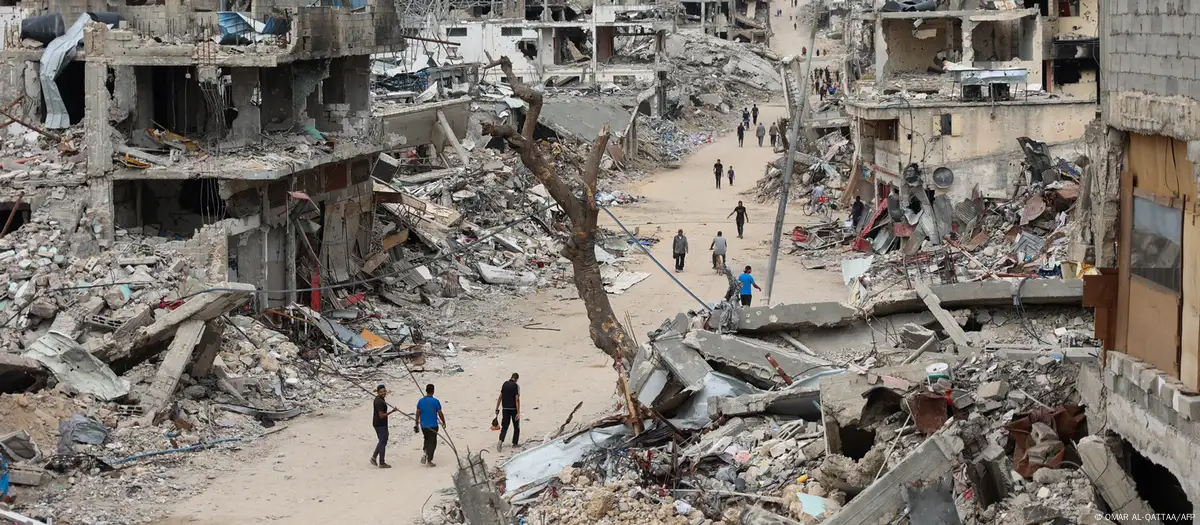A Belgian non-profit is trying to prosecute Israeli soldiers, should they leave Israel, for alleged war crimes. German law would allow for this. Could Israeli soldiers on vacation in Germany be arrested?
A Brussels-based foundation has made international headlines with its very specific mission: to prosecute Israeli soldiers suspected of war crimes while they’re traveling abroad.
Last week, the Hind Rajab Foundation (HRF) was in the news after its most successful attempt so far to prosecute an individual Israeli soldier. A judge in Brazil instructed federal police to investigate Yuval Vagdani, 21, who was on vacation there. Vagdani had previously posted videos and pictures of himself destroying civilian buildings in Gaza, HRF said.
Then, this week, HRF filed a complaint against Major General Ghassan Alian, the head of the Israeli government’s Coordinator of Government Activities in the Territories (COGAT). He is known for comments he made three days after Hamas’ October 7, 2023, attack on Israel, which resulted in the deaths of around 1,200 people and the abduction of over 250 others.
“Human animals must be treated as such,” Alian said in a video message directed at Gaza locals. “There will be no electricity and no water. There will only be destruction. You wanted hell; you will get hell.”

His statement is often quoted by rights organizations as proof of Israel’s genocidal intent against Palestinians. Since October 7, 2023, an Israeli military campaign in Gaza has killed over 45,000 people.
On Monday, HRF said Alian was in Rome on a “secret visit” and asked Italian authorities to arrest him.
International campaign
Founded as a non-profit in September 2024 and named after Hind Rajab, a six-year-old who died alone in her family’s car that was shelled by Israeli forces, HRF has pursued similar complaints around the world, including in Ecuador, the United Arab Emirates, Sri Lanka, France, Cyprus and Thailand.
Israeli officials regularly claim HRF is run by antisemitic or anti-Israel extremists, something HRF’s founders deny.
In an interview with an independent news show, “System Update”, over the weekend, HRF chairman Dyab Abou Jahjah explained how they work.
Over the past year, Israeli soldiers have posted thousands of videos and pictures on social media of their time in Gaza. These include videos of soldiers who say they are exacting “revenge,” as well as evidence of other behaviors such as looting, setting fire to houses, posing next to dead bodies and talking openly about torturing and exterminating Palestinians.
The Israeli military has told soldiers not to make or post such videos.
In early December, the Washington Post verified around 120 videos and found some were “effectively logging evidence of possible violations of international humanitarian law.”
Jahjah explained that HRF also uses this kind of open-source information.
Not all Israeli soldiers are targeted, only those committing possible violations, he said. Potential cases are prepared when evidence comes to light but only used if and when the alleged perpetrator travels abroad. Volunteer lawyers in other countries then file the cases against them.

Could the same thing happen in Germany?
HRF has not yet filed any cases in Germany against Israeli soldiers, a spokesperson told DW. But the law in Germany would allow for the prosecution of war crimes committed overseas by non-nationals, says lawyer Alexander Schwarz, co-director of the International Crimes and Accountability Program at the Berlin-based European Center for Constitutional and Human Rights. He noted that since 2002, Germany has incorporated international crimes into its legal system with its Code of Crimes against International Law, or CCAIL.
Of the different kinds of international crimes, a “war crime” could be most easily prosecuted, Schwarz explained. “For example, a soldier unlawfully kills one civilian in Gaza,” he continued. “But when we’re talking about ‘crimes against humanity,’ it’s much harder to prosecute because the threshold for proving this is much higher.”
In Germany, federal prosecutors must also decide whether to investigate such cases. An organization like HRF could file a complaint, but a German prosecutor has “discretion” about whether to proceed when it comes to crimes involving non-nationals.

German authorities have discretion when it comes to non-Germans but are actually obligated by law to investigate when Germans are victims overseas, Schwarz pointed out. However, a case involving the October 2024 deaths of the German-Palestinian Abujadallah family of six, due to Israeli bombing of Gaza, has apparently not been investigated under international law. Neither has the case of German-Israeli woman Shani Louk, who was killed in the Hamas attack on October 7. Only domestic law has been used.
“That’s why we have argued the federal prosecutor is not fulfilling his duty to investigate,” Schwarz said.
This also means German prosecutors are less likely to investigate a case involving Israeli soldiers traveling in Germany, he added.
Kai Ambos, a professor of international criminal law at the University of Göttingen, largely agrees. “We have the CCAIL and universal jurisdiction, and the German attorney general would normally act if a suspect was present in Germany. He could even undertake a so-called ‘structural investigation’ if the perpetrator is still abroad,” Ambos told DW. “But the case of Israel is highly sensitive, and there is certainly political opposition, which may impact investigations against Israeli citizens.”
No verdicts
Up until now, HRF’s evidence has not been tested in court. According to a recent story in the US weekly New Yorker magazine, several cases are progressing in the Netherlands, Belgium, and France, but as yet, nothing has gone before a judge.
In the Brazilian case last week, the Israeli soldier erased his social media posts and fled the country with help from the Israeli government.

This week’s case in Italy would likely also run into problems, German lawyers told DW, because, unlike Germany, Italy has not incorporated international law into its legal code.
However, as a form of “lawfare,” acts defined as the “use of legal action to cause problems for an opponent,” HRF has had an impact.
The New York Times reported last week that Israeli officials were downplaying HRF complaints, commenting that none had made it to court.
However, all the HRF incidents have caused an uproar in Israeli media, and in the recent past, soldiers have been warned to return home from some countries immediately, for fear of arrest.
Late last week, the Israeli army also tightened up rules for media coverage of soldiers, in order to protect them from possible prosecution while overseas. Now, all those serving under the rank of colonel will not be allowed to show their faces or full names or be linked to the specific combat event they participated in.










